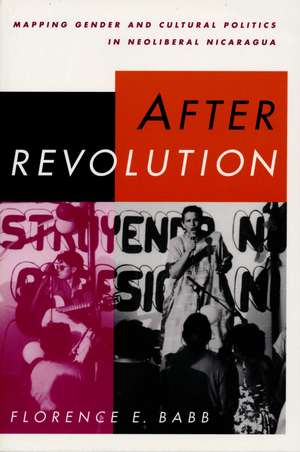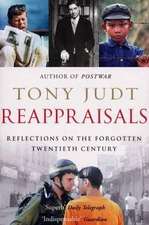After Revolution: Mapping Gender and Cultural Politics in Neoliberal Nicaragua
Autor Florence E. Babben Limba Engleză Paperback – noi 2001
Drawing on ethnographic research conducted throughout the 1990s, Florence Babb describes the negative consequences that have followed the return to a capitalist path, especially for women and low-income citizens. In addition, she charts the growth of women's and other social movements (neighborhood, lesbian and gay, indigenous, youth, peace, and environmental) that have taken advantage of new openings for political mobilization. Her ethnographic portraits of a low-income barrio and of women's craft cooperatives powerfully link local, cultural responses to national and global processes.
Preț: 240.63 lei
Nou
Puncte Express: 361
Preț estimativ în valută:
46.04€ • 50.17$ • 38.80£
46.04€ • 50.17$ • 38.80£
Carte tipărită la comandă
Livrare economică 23 aprilie-07 mai
Preluare comenzi: 021 569.72.76
Specificații
ISBN-13: 9780292709003
ISBN-10: 0292709005
Pagini: 314
Ilustrații: 40 b&w photographs, 3 maps
Dimensiuni: 152 x 229 x 15 mm
Greutate: 0.45 kg
Ediția:New.
Editura: University of Texas Press
Colecția University of Texas Press
ISBN-10: 0292709005
Pagini: 314
Ilustrații: 40 b&w photographs, 3 maps
Dimensiuni: 152 x 229 x 15 mm
Greutate: 0.45 kg
Ediția:New.
Editura: University of Texas Press
Colecția University of Texas Press
Notă biografică
Florence E. Babb is Chair of the Department of Anthropology and Professor of Anthropology and Women’s Studies at the University of Iowa.
Cuprins
- Acknowledgements
- 1. Introduction: Writing after Revolution
- 2. Negotiating Spaces: The Gendered Politics of Location
- 3. "Managua Is Nicaragua": Gender, Memory, and Cultural Politics
- 4. A Place on a Map: The Local and the National Viewed from the Barrio
- 5. Unmaking the Revolution: Women, Urban Cooperatives, and Neoliberalism
- 6. From Cooperatives to Microenterprises in the Postrevolutionary Era
- 7. Narratives of Development, Nationhood, and the Body
- 8. Toward a New Political Culture
- 9. Conclusion: Remembering Nicaragua
- Notes
- Bibliography
- Index
Descriere
How Nicaragua's least powerful citizens have fared since the Sandinista revolution.









